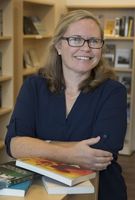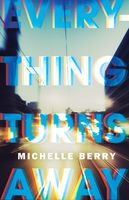Acclaimed Novelist Michelle Berry on an Inspiring Butter Dish, Playing Favourites, and Borrowing a Title from Auden
For those alive at the time, 9/11 became a line in the sand; there was before, and there was after. No one knew when they woke up September 11, 2001 that the world was going to change. That includes the characters in acclaimed novelist and bookseller Michelle Berry's newest book Everything Turns Away (Wolsak & Wynn).
Weaving together violence both personal and political, intimate and international, Everything Turns Away follows Sophie and Paul and a missing babysitter. A dinner party disaster, a kitchen covered in blood, and then suddenly, a world upended.
Berry's incisive observations and deft, taut writing plungers readers into not only a murder mystery and a chilling domestic thriller, but an insightful exploration of how quickly and unexpectedly lives can be changed in an instant. Compelling and rich, it's a great addition to Berry's compulsively readable oeuvre.
We're excited to speak with Michelle today about Everything Turns Away as part of our Long Story interview series for novelists. She tells us about the butter dish that started it all, why she loved writing a novel set in Toronto, and why her favourite character in the book is one without a name.
Open Book:
Do you remember how your first started this novel or the very first bit of writing you did for it?
Michelle Berry:
I started with the butter dish and the dinner party. I remember typing the sentence, “It all began with the butter dish” and going from there. The dinner party evolved as I typed and I realized that something big was going to happen to this bickering couple, that this was the lead up to the world changing for them. I started writing this in about 2006 and 9/11 was huge on my radar then – the world had changed because of it. I was still ducking when I heard airplanes overhead and had been affected by the news and the horror and tragedy of it all. I had two small children and was living in Toronto. I wasn’t like the people in my book, but I did have dinner parties and all my friends seemed stuck and confused about how they had become “adults.” There were arguments among the married couples, the parents. It was a time of figuring out who you were in relation to your spouse. Like the Talking Heads we were all asking, “How did I get here?” So the butter dish sentence pushed me down the rabbit hole – the murder and the missing babysitter came later. The book really started as a look at fairly new marriages in a white/rich Toronto, or what I imagined a white/rich Toronto would look like, in the early 2000’s.
OB:
How did you choose the setting of your novel? What connection, if any, did you have to the setting when you began writing?
MB:
I was living in The Beach in Toronto but as a student at University had lived in the Annex and on the Danforth. I loved the idea of using the Bloor Street Viaduct as a go-between for the characters. I love to play with structure in my books and the idea of the characters moving back and forth across this bridge for the whole novel was very appealing to me. I could see it clearly in my mind. Toronto is a spectacular city and fun to write about – lots of amazing neighbourhoods with different vibes. It feels like the New York of Canada and this was applicable to my plot.
OB:
Did you find yourself having a "favourite" amongst your characters? If so, who was it and why?
MB:
I usually don’t have favourites, I find that in order to write a believable character you have to focus hard on all of them and so you end up with all of them being the favourite. But in this case I would say my anonymous man, the second person narrator, is my favourite. I still can’t get a hold of exactly who he is, he’s blurry for me – and that makes him exceptional to me as a writer because every time I read him (after all my editing!) I want to know more about him. After so many reads of my book it’s thrilling to have one character still be mysterious to me. And I feel sorry for him and any time I get a visceral reaction to a character that’s good.
Your CanLit News
Subscribe to Open Book’s newsletter to get local book events, literary content, writing tips, and more in your inbox
OB:
If you had to describe your book in one sentence, what would you say?
MB:
This is a literary thriller about two unhappy couples in Toronto and how they negotiate their lives during the horrendous events that swirl around them; all in one night – a missing babysitter, a gruesome murder, and the startling way the world changed minutes after the first planes hit the World Trade Center on 9/11 combine to wreck havoc upon their previously mundane lives. Phew! That really should have been three sentences.
OB:
Did you include an epigraph in your book? If so, how did you choose it and how does it relate to the narrative?
MB:
Yes. The epigraph contains the title. It’s from a poem by W. H. Auden called, “Musee Des Beaux Arts” and it’s a poem about Auden sitting in this art gallery in Belgium and staring at what he thought was the Breughel painting “The Fall of Icarus” (later it has been proven that the painting isn’t actually by Breughel, it’s by an apprentice, but Auden didn’t know this at the time). The painting depicts Icarus falling from the sky with melted wings – everyone around him, in the painting, is doing something else and not watching Icarus fall – Auden writes that “everything turns away quite leisurely from the disaster.” To me the poem speaks of how significant events can happen in our lives and how they affect us depends on our frame of mind at the time or what we are watching or doing or what is going on around us. Or even who we are – Auden mentions dogs and horses in the painting “where the dogs go on with their doggy life and the torturer’s horse scratches its innocent behind on a tree.” I remember that during 9/11 the way you were affected by it corresponded to how you took it in – did you see it while running down the street covered in ash in New York? Or on the TV in Toronto – live? The next hour? The next day? Did you know someone who was killed? Were you asleep when it happened and woke up after it was over? And the significant events that happen after the dinner party meshed with 9/11 in this book and how everyone took everything in became a central theme. The epigraph fit – and became the title.
OB:
What if, anything, did you learn from writing this novel?
MB:
I’ve learned so much. I’ve learned that I actually have a great deal of patience. I’ve learned that I can put a novel in my archives and ignore it for years and then take it out again and suddenly remember why I loved it. I’ve learned that even a book I wrote 15 years ago can still sing, that the “shelf life” of a thought or an idea or a plot or a character is much longer than I thought – even when everything in life moves so quickly these days. I’ve learned that I can look back on a time in my life – Toronto, 9/11, new babies, dinner parties, fear, guilt, etc. – and feel it all over again as if it were just happening. And, most importantly, I’ve learned that there are others out there, specifically publishers and editors, who feel the same way I do about my book – it’s a great feeling. And humbling.
_____________________________________________
Michelle Berry is the author of three books of short stories and five previous novels. Her short story collection I Still Don’t Even Know You won the 2011 Mary Scorer Award for Best Book Published by a Manitoba Publisher and was shortlisted for a 2011 ReLit Award, and her novel This Book Will Not Save Your Life won the 2010 Colophon Award and was longlisted for the 2011 ReLit Award. Her writing has been optioned for film and published in the UK.
Berry was a reviewer for the Globe and Mail for many years, and teaches online for the University of Toronto and is often a mentor at Humber College. Berry now lives in Peterborough, ON, where she operates an independent bookstore, Hunter Street Books.






